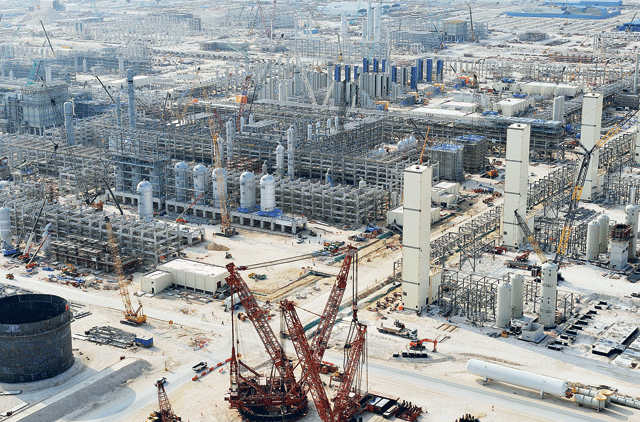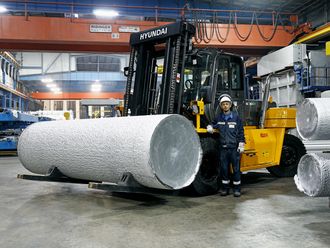
Moscow/London: Qatar, the world's largest producer of liquefied natural gas, will idle 66 per cent of its export plants this year, reversing earlier plans and joining Russia in curtailing supply amid a global glut.
Qatar's two LNG producers, Ras Laffan Liquefied Natural Gas and Qatar Liquefied Gas, had an "unusually heavy" maintenance programme during the past two months that shut six of 12 production units for several weeks, New York-based consultant Poten & Partners said in a report. Another two units will undergo repairs this summer.
Russian gas-export monopoly Gazprom, which supplies about a quarter of Europe's gas, cut its 2010 production goal on Wednesday because of reduced demand. Qatar has changed tack from a January comment by Faisal Al Suwaidi, then chief executive officer of QatarGas, that his company probably wouldn't idle any LNG units for maintenance in 2010. Qatar and Russia rejected a proposal by Algeria in April that exporting nations trim shipments to support prices.
"There have been more shutdowns globally than we have seen in the past, and LNG units are being shut," said Andrew Pearson, an analyst at Edinburgh-based consultant Wood Mackenzie. "Suppliers are trying to support the market on one hand, but on the other hand, holding the gas back for future months and years when the price is more attractive."
Prices are less than a third of the record $15.78 (Dh57.94) reached in Dec-ember 2005, when cold weather drained inventories already depleted by earlier hurricane damage in the Gulf of Mexico.
US gas futures slumped 31 per cent during the first three months of the year, fluctuated near $4 per million British thermal units during April, then rose 19 per cent since May 24, to close at $4.677 Wednesday on the New York Mercantile Exchange. Gas for delivery in July 2011 was $5.384 per million Btu, a premium of 15 per cent over the front-month contract. At the start of the year, the premium for July 2011 over gas for July this year stood at 6.6 per cent.
Gazprom said it aims to produce 519.3 billion cubic metres of gas this year, scaling back an earlier forecast of 529 billion.
"Gazprom is now revising down figures because of a lack of demand," Vsevolod Cherepanov, head of the gas, condensate and oil production department, told reporters in Moscow.
Qatar's decision to shut units even as it increases overall capacity underscores the challenge LNG producers face in balancing abundant supplies with long-term expectations of demand growth. LNG is gas that is cooled and transformed into a liquid for transportation by ship.
Worldwide consumption of gas fell 2.1 per cent last year, BP said in its annual Statistical Review of World Energy on Wednesday, the first decline on record and the most among the major fuel types.
RasGas reported its first LNG shutdown in April and QatarGas followed in May. The combined output of the units being shuttered is 41 million tonnes a year, out of the country's export capacity of 61.5 million.
Gas prices have fallen during the past year as more nations boost exports and the US, the world's biggest consumer, increases domestic production from shale-rock deposits. A global oversupply of gas is expected to continue for another five years, Bernhard Reutersberg, chief executive officer of German utility E.ON Ruhrgas AG, said last month.
Qatar aims to boost LNG capacity 43 per cent this year to an annual 77 million tonnes by adding three new trains to the dozen already operating. It accounted for 20 per cent of global exports in 2009, selling mostly to Japan, South Korea, India and Spain, according to BP.
Additional supplies entered the market even as US stockpiles jumped to the highest in a decade in May, according to the Energy Department. European gas purchasers, including Essen-based E.ON Ruhrgas, have cut the amount bought under long-term contracts, which are linked to oil prices, and are instead seeking more from the spot market, which is typically cheaper.
Crude oil for July delivery rose 3.3 per cent to $74.38 a barrel on Wednesday on Nymex. Oil prices are down 6.2 per cent this year after rallying 78 per cent in 2009.
Members of the Gas Exporting Countries Forum, which includes Russia, Iran and Qatar, failed to agree in April on an Algerian proposal to buttress prices by reducing spot sales. Qatari Minister of State for Energy Mohammad Al Sada said in March that his country didn't plan to reduce output to support prices.











